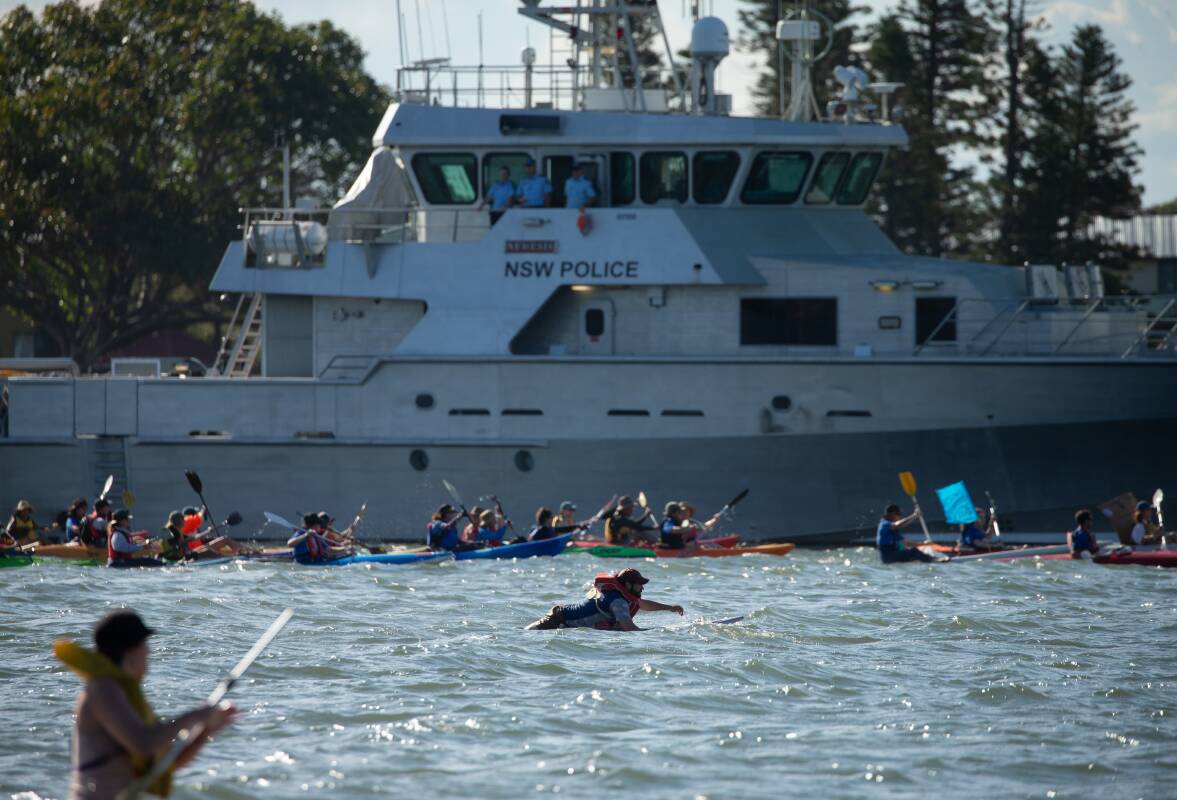














































A group of protesters who overstayed their permit to blockade Newcastle port following a 30-hour climate protest last November have faced court, with most of them escaping conviction as a magistrate described their intentions as "noble" despite being outside the law.
More than 30 people pleaded guilty on Thursday to the fine-only charge of "operate vessel so as to interfere with others' use of waters", which carries a maximum penalty of $5500.
The charges came after police arrested more than 100 people associated with advocacy group Rising Tide when they refused to leave the water after the 4pm deadline on their permit passed.
They remained on the water in kayaks and other small vessels until police retrieved them. It came at the end of a peaceful weekend-long authorised protest.
Those who appeared before Magistrate John Chicken on Thursday came from Queensland, Victoria, and Canberra - as well as locally. Many represented themselves, though the Environmental Defenders Office took up the case for a few.
Like the last group to face court, earlier in January, it included people from a broad range of backgrounds such as teaching, nursing, psychology, environmental engineering, and a former Navy serviceman.
Of the 36 people who entered a plea on Thursday, 30 had their charge dismissed, while two were convicted and received no other punishment, and three were convicted and fined - the largest fine was $400.
One man pleaded not guilty and will joined four other matters adjourned to February 15.
The ruling for each individual's case was based largely on their prior record, the court heard.
Magistrate Chicken said the protesters had "noble intentions, albeit they ended up in an infraction of the law".
He said they were motivated by "selflessness" and "out of genuine concerns for the climate and the future of the earth", which was a mitigating factor in sentencing.
And he praised police for their handling of events as they unfolded.
"In all of the material before me, there has not been one suggestion of inappropriateness of police on the day," he said.
While Magistrate Chicken said peaceful protests were important in democratic societies, they should take place legally.
"There is no suggestion [the protest] was anything other than peaceful," he said.
"There's no doubt that the people involved in this protest were all doing so out of a genuine desire to better the world. There is not one person here who has been charged with this offence who did so out of an act of selfishness."
Rising Tide volunteer organiser and law student Zach Schofield said the advocacy group wanted a 75 per cent tax on coal export profits to urgently fund a transition plan to help workers and communities in areas reliant on the fossil fuel industry.
"The climate crisis is causing devastating heat waves, droughts, fires and floods that are fuelled by fossil fuels," he said.
"Yet the Albanese government is allowing massive new coal and gas expansions, including here in the Hunter."
Valentine man Peter Morris, who presented a personal reference letter to the court from Lake Macquarie MP Greg Piper, said he participated in the extended blockade because he felt a personal responsibility to act.
"I feel that it is wrong for people to sit idly by in the face of this criminal abdication of leadership," the 71-year-old said.
"My conscience will not allow me to sit on the sidelines while Australia remains laggard, so over recent years I have taken many conservative and legal actions to bring about change.
"The Commonwealth and NSW governments are failing the people of the country, the state and the planet because our slow transition from fossil fuels is damaging the planet in an unjustifiable manner."
Dozens of protesters had their matters dealt with in court before Magistrate Stephen Olischlager on January 11 - with rulings ranging from dismissal of charges to convictions and fines.
Two men - 65-year-old John Max Wurcker and 23-year-old Isaac Leonard - were each convicted and fined in Newcastle Local Court on November 27 after spending a night in custody.
Five juveniles were dealt with under the Young Offenders Act, which diverts minors from the criminal justice system.







